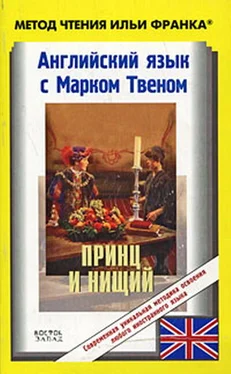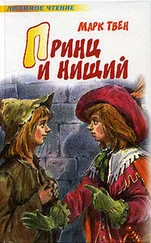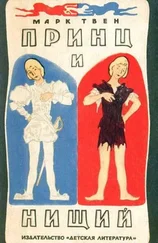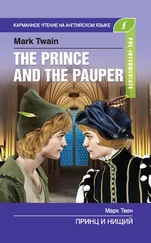pageant [`pæGənt], parliament [`pa:ləmənt], argue [`a:gju:]
WHEN Tom Canty awoke the next morning, the air was heavy with a thunderous murmur; all the distances were charged with it. It was music to him; for it meant that the English world was out in its strength to give loyal welcome to the great day.
Presently Tom found himself once more the chief figure in a wonderful floating pageant on the Thames; for by ancient custom the 'recognition procession' through London must start from the Tower, and he was bound thither.
When he arrived there, the sides of the venerable fortress seemed suddenly rent in a thousand places, and from every rent leaped a red tongue of flame and a white gush of smoke; a deafening explosion followed, which drowned the shoutings of the multitude, and made the ground tremble; the flame-jets, the smoke, and the explosions were repeated over and over again with marvelous celerity, so that in a few moments the old Tower disappeared in the vast fog of its own smoke, all but the very top of the tall pile called the White Tower; this, with its banners, stood out above the dense bank of vapor as a mountain peak projects above a cloud-rack.
Tom Canty, splendidly arrayed, mounted a prancing war-steed, whose rich trappings almost reached to the ground; his 'uncle,' the Lord Protector Somerset, similarly mounted, took place in his rear; the King's Guard formed in single ranks on either side, clad in burnished armor; after the Protector followed a seemingly interminable procession of resplendent nobles attended by their vassals; after these came the lord mayor and the aldermanic body, in crimson velvet robes, and with their gold chains across their breasts; and after these the officers and members of all the guilds of London, in rich raiment, and bearing the showy banners of the several corporations. Also in the procession, as a special guard of honor through the city, was the Ancient and Honorable Artillery Company — an organization already three hundred years old at that time, and the only military body in England possessing the privilege (which it still possesses in our day) of holding itself independent of the commands of Parliament. It was a brilliant spectacle, and was hailed with acclamations all along the line, as it took its stately way through the packed multitudes of citizens. The chronicler says, 'The king, as he entered the city, was received by the people with prayers, welcomings, cries, and tender words, and all signs which argue an earnest love of subjects toward their sovereign; and the king, by holding up his glad countenance to such as stood afar off, and most tender language to those that stood nigh his Grace, showed himself no less thankful to receive the people's good will than they to offer it. To all that wished him well, he gave thanks. To such as bade "God save his Grace," he said in return, "God save you all!" and added that "he thanked them with all his heart." Wonderfully transported were the people with the loving answers and gestures of their king.'
In Fenchurch Street (на улице Фенчерч) a 'fair child (белокурый ребенок), in costly apparel (в дорогом наряде),' stood on a stage (встал на помост) to welcome his majesty to the city (чтобы встретить его величество (при входе) в город). The last verse of his greeting (последняя строфа его приветствия) was in these words (была в таких словах):
Welcome, O King (добро пожаловать, о король)! as much as hearts can think (так много как = насколько сердца могут помыслить);
Welcome again (добро пожаловать снова), as much as tongue can tell (насколько язык может сказать) —
Welcome to joyous tongues (приветствие радостным языкам), and hearts that will not shrink (и сердцам, которые не отступят);
God thee preserve (Бог да хранит тебя), we pray (мы молимся), and wish thee ever well (и желаем тебе вечного добра).
The people burst forth in a glad shout (люди разразились радостным криком; to burst forth — прорваться: «взорваться вперед»), repeating with one voice (повторяя в один голос) what the child had said (/то/, что ребенок сказал). Tom Canty gazed abroad (Том Кэнти посмотрел вдаль) over the surging sea (на вздымающееся море; to surge) of eager faces (возбужденных лиц), and his heart swelled with exultation (и его сердце наполнилось ликованием); and he felt that the one thing (и он почувствовал, что единственной вещью) worth living for (ради которой стоит жить: «достойной жизни для») in this world (в этом мире) was to be a king (было быть королем), and a nation's idol (и кумиром народа). Presently he caught sight (вскоре он поймал вид = заметил; to catch — ловить), at a distance (на расстоянии), of a couple of his ragged (пары его оборванных) Offal Court comrades (товарищей по Тупику Отбросов) — one of them (один из них) the lord high admiral in his late mimic court (лорд-адмирал при его прежнем потешном дворе), the other the first lord of the bedchamber (другой — первый лорд опочивальни) in the same pretentious fiction (в том же вычурном вымысле); and his pride swelled (и его гордость возросла) higher than ever (выше, чем когда-либо). Oh, if they could only (о, если бы только они могли) recognize him now (узнать его сейчас)! What unspeakable glory it would be (каким невыразимым триумфом это было бы), if they could recognize him (если бы они могли узнать его), and realize that the derided mock king (и понять, что осмеянный шутовской король) of the slums and back alleys (трущоб и задворков: «задних переулков») was become a real king (стал настоящим королем), with illustrious dukes and princes (с блистательными герцогами и принцами) for his humble menials (в качестве его покорных слуг), and the English world at his feet (и с английским миром у его ног)! But he had to deny himself (но он должен был отказать себе), and choke down his desire (и подавить свое желание; to choke — душить, подавить(ся)), for such a recognition (ибо такое признание) might cost more (могло бы стоить больше) than it would come to (чем оно дало бы); so he turned away his head (так что он отвернул прочь свою голову), and left the two soiled lads (и оставил двоих грязных мальчуганов; soil — грунт, земля, почва; to soil — пачкать, грязнить) to go on with their shoutings and glad adulations (продолжать свои выкрики и радостные возгласы; adulation — лесть), unsuspicious (не подозревающими) of whom it was (о том, кто это был) they were lavishing them upon (на кого они изливали их = приветствия).
Читать дальше
Конец ознакомительного отрывка
Купить книгу




![Марк Твен - Принц и нищий [Издание 1941 г.]](/books/148799/mark-tven-princ-i-nichij-izdanie-1941-g-thumb.webp)







